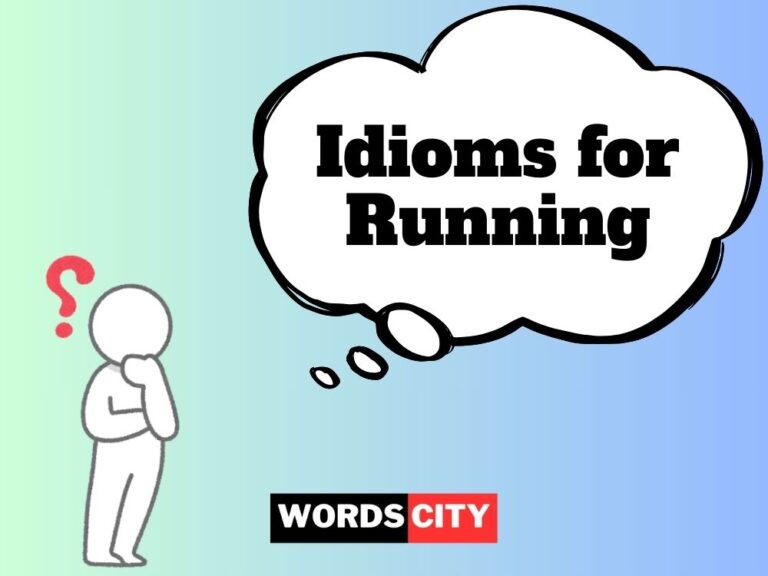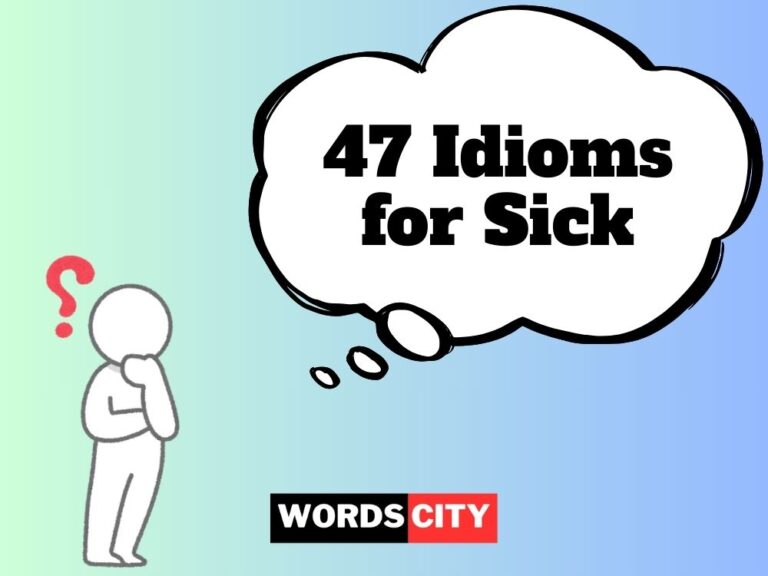Talking about death can feel heavy, but language has found countless creative ways to soften the blow, add humor, or convey reverence. Idioms for death—sometimes called euphemisms—let us discuss the end of life without using the stark word “die.” They appear in literature, movies, and everyday conversation, giving us poetic, witty, or gentle alternatives that reflect cultural attitudes toward mortality.
In this post, you’ll explore fifty vivid idioms for death, learn what they mean, and see them in action through long, context‑rich sentences. By understanding these expressions, you’ll enrich your vocabulary, appreciate the artistry of language, and navigate delicate conversations with greater ease.
Idioms for Death
1. Kick the bucket
Meaning: A humorous way to say someone has died.
In a Sentence: After a life packed with impromptu road trips, experimental cooking disasters, and countless stories that grew taller with every retelling, Grandpa Earl finally kicked the bucket on a quiet Sunday morning while the birds outside his window sang him into eternity.
Other Ways to Say: Bite the dust, Pass away
2. Pass away
Meaning: A gentle, respectful way to say someone has died.
In a Sentence: Surrounded by family, soft music, and the scent of her favorite lavender candles, Aunt Maria passed away with a serene smile that seemed to thank everyone for the love they had shown her.
Other Ways to Say: Depart this life, Rest in peace
3. Bite the dust
Meaning: To die, often suddenly or violently.
In a Sentence: The aging outlaw bit the dust beneath the scorching desert sun, his final showdown echoing through the dusty canyon like a legend coming to its inevitable close.
Other Ways to Say: Kick the bucket, Croak
4. Meet one’s maker
Meaning: To die and face judgment or the afterlife.
In a Sentence: After decades of daring mountain climbs and near‑miss adventures, the famed explorer met his maker on the very peak that had lured him since childhood.
Other Ways to Say: Face the last curtain, Answer the final call
5. Cross the great divide
Meaning: To transition from life to death.
In a Sentence: When the old poet finally crossed the great divide, his well‑worn notebooks fluttered open, as if releasing their verses into the quiet night air.
Other Ways to Say: Step into the beyond, Sail into the west
6. Give up the ghost
Meaning: To die, often after a struggle or illness.
In a Sentence: The antique clock in the hallway gave up the ghost at the exact moment its owner, who had spent years restoring it, drew his last breath.
Other Ways to Say: Expire, Succumb
7. Six feet under
Meaning: Buried in the ground; dead and buried.
In a Sentence: The rumor mill insisted the gangster was six feet under, yet his legend kept strolling the city streets long after his funeral.
Other Ways to Say: Laid to rest, Pushing up daisies
8. Push up daisies
Meaning: To be dead and buried, with flowers growing above.
In a Sentence: Someday, we will all be pushing up daisies, so we might as well plant some beauty while we’re still above ground.
Other Ways to Say: Six feet under, Turn to dust
9. Shuffle off this mortal coil
Meaning: To die and leave behind earthly troubles.
In a Sentence: After decades of tirelessly fighting injustice, the venerable judge finally shuffled off this mortal coil, leaving a legacy carved into the very laws she helped shape.
Other Ways to Say: Depart this life, Leave this mortal realm
10. Go to a better place
Meaning: To die, with the belief of entering a peaceful afterlife.
In a Sentence: The hospice nurse whispered that Mr. Lin had gone to a better place, and the family, comforted by the idea, felt the room brighten despite their tears.
Other Ways to Say: Rest in peace, Be called home
11. Join the choir invisible
Meaning: A poetic way of saying someone has died.
In a Sentence: When the beloved soprano joined the choir invisible, the opera house dimmed its lights in silent tribute to the voice that once filled its grand hall.
Other Ways to Say: Meet the grim reaper, Cross the great divide
12. Cash in one’s chips
Meaning: To die, likened to ending a game of chance.
In a Sentence: The seasoned gambler cashed in his chips with a final grin, satisfied that he had played every hand life dealt him to the fullest.
Other Ways to Say: Punch one’s ticket, Check out
13. Buy the farm
Meaning: To die, originally military slang.
In a Sentence: The test pilot bought the farm during a daring maneuver, and the sky seemed to salute his courage with a sudden burst of sunlight through the clouds.
Other Ways to Say: Go down in flames, Kick off
14. Go the way of all flesh
Meaning: To die, emphasizing human mortality.
In a Sentence: Even the mighty kings eventually go the way of all flesh, their grand palaces reduced to ruins that whisper of impermanence.
Other Ways to Say: Perish, Be no more
15. Sleep the big sleep
Meaning: To die, phrased as an eternal sleep.
In a Sentence: The detective’s last case ended, and he slipped into the big sleep, his trench coat folded neatly at the foot of the bed like a closed chapter.
Other Ways to Say: Take the long sleep, Rest forever
16. Depart this life
Meaning: A formal way to say someone has died.
In a Sentence: The renowned scholar departed this life with a pen in hand, mid‑sentence, as if determined to write his way into the next chapter.
Other Ways to Say: Pass away, Exit the stage
17. Answer the final call
Meaning: To die when summoned by fate or deity.
In a Sentence: When the lighthouse keeper answered the final call, the beacon still shone, guiding sailors just as he had done for forty faithful years.
Other Ways to Say: Meet one’s maker, Face the last curtain
18. Take the long sleep
Meaning: To die, viewed as an extended sleep.
In a Sentence: After months of pain, she welcomed the chance to take the long sleep, her last sigh mingling with the rustle of autumn leaves outside the window.
Other Ways to Say: Sleep the big sleep, Rest eternally
19. Rest in peace
Meaning: A blessing for the deceased to rest without disturbance.
In a Sentence: The inscription simply read “Rest in Peace,” yet the flowers piled high around the stone told a richer story of lives he had quietly touched.
Other Ways to Say: Sleep with the angels, Be at peace
20. Turn up one’s toes
Meaning: A humorous or old‑fashioned way to say someone has died.
In a Sentence: When the famously stubborn tortoise finally turned up his toes, the entire village held a quirky parade in honor of the creature that had outlived three mayors.
Other Ways to Say: Peg out, Croak
21. Check out
Meaning: To die, likened to leaving a hotel.
In a Sentence: The legendary drummer checked out during a sold‑out encore, drumsticks frozen mid‑air like punctuation marks to a life lived loud.
Other Ways to Say: Cash in one’s chips, Punch one’s ticket
22. Leave this mortal realm
Meaning: To die and depart from earthly existence.
In a Sentence: As the final bell tolled, the monk left this mortal realm with a peaceful breath that seemed to carry centuries of wisdom into the ether.
Other Ways to Say: Shuffle off this mortal coil, Cross over
23. Go home in a box
Meaning: To die and be transported in a coffin, often used in military contexts.
In a Sentence: Every soldier knew the risk of going home in a box, yet they marched onward, courage outweighing fear with every synchronized step.
Other Ways to Say: Come back under a flag, Make the ultimate sacrifice
24. Be called home
Meaning: To die, with the implication of returning to a divine home.
In a Sentence: When Nana was called home, the old farmhouse felt strangely fuller, as if her spirit lingered in the scent of fresh bread and the creak of the rocking chair.
Other Ways to Say: Go to a better place, Be at peace
25. Dance with the reaper
Meaning: To die, often after flirting with danger.
In a Sentence: The stunt cyclist finally danced with the reaper during a record‑breaking jump that left the crowd cheering and gasping in the same breath.
Other Ways to Say: Meet the grim reaper, Court death
26. Step into the beyond
Meaning: To die and move into whatever lies after life.
In a Sentence: The philosopher smiled as he stepped into the beyond, eager to confirm—or refute—his lifelong theories about the afterlife.
Other Ways to Say: Cross the great divide, Enter the unknown
27. Go over to the other side
Meaning: To die and transition to an afterlife or spirit world.
In a Sentence: The medium claimed her sister had gone over to the other side but still sent butterfly‑soft messages on summer breezes.
Other Ways to Say: Pass on, Cross over
28. Draw one’s last breath
Meaning: To breathe for the final time.
In a Sentence: He drew his last breath just as dawn painted the sky pink, as though the universe timed its masterpiece to honor his exit.
Other Ways to Say: Exhale for the final time, Expire
29. Face the last curtain
Meaning: To die, likened to the end of a theatrical performance.
In a Sentence: The veteran actor faced the last curtain in a hospital room rather than onstage, yet the applause in his memories was loud enough to carry him onward.
Other Ways to Say: Meet one’s maker, Take a final bow
30. Ride into the sunset
Meaning: To die or retire permanently, often used in Westerns.
In a Sentence: After signing the peace treaty that ended decades of conflict, the weary general rode into the sunset, his silhouette melting into history.
Other Ways to Say: Fade away, Take the last ride
31. Sail into the west
Meaning: To die, drawn from mythic or literary imagery.
In a Sentence: The ancient mariner sailed into the west on a sea so calm it mirrored the heavens, as though both realms conspired to guide him home.
Other Ways to Say: Journey beyond the horizon, Cross the great sea
32. Walk the last mile
Meaning: To approach death, originally referring to a prisoner’s final walk.
In a Sentence: Knowing he was walking the last mile, the old boxer laced up his gloves one final time to mentor the kid who reminded him of himself.
Other Ways to Say: Face the end, Make the final walk
33. Make one’s last journey
Meaning: To die, seen as embarking on a final voyage.
In a Sentence: With her passport full of stamps and her heart full of stories, the travel writer made her last journey without packing a single suitcase.
Other Ways to Say: Depart for the great unknown, Take the ultimate trip
34. Go belly up
Meaning: To die, often used for animals or companies; literally to float upside‑down.
In a Sentence: The goldfish went belly up overnight, and the child held a solemn toilet‑side funeral complete with a eulogy and a kazoo dirge.
Other Ways to Say: Croak, Peg out
35. Expire
Meaning: A formal or medical term for dying.
In a Sentence: The patient expired at 3:14 a.m., and the steady beep that had marked his heartbeat slipped into a flat line like a curtain falling on the scene.
Other Ways to Say: Decease, Pass away
36. Succumb
Meaning: To die after struggle, usually from illness or injury.
In a Sentence: After a heroic fight against the virus, she succumbed in the early dawn, leaving behind research notes that might one day save others.
Other Ways to Say: Give in, Perish
37. Croak
Meaning: A slang, somewhat crude way to say someone has died.
In a Sentence: The mob boss croaked during breakfast, his half‑eaten omelet becoming an unlikely crime‑scene landmark.
Other Ways to Say: Kick the bucket, Snuff it
38. Peg out
Meaning: British slang for dying.
In a Sentence: The cricket commentator pegged out mid‑sentence, headset still buzzing with the cheers he loved so much.
Other Ways to Say: Turn up one’s toes, Pop off
39. Go down for the count
Meaning: To die, likened to a boxer knocked out permanently.
In a Sentence: The legendary heavyweight finally went down for the count, his championship belts gleaming like medals in a museum of memories.
Other Ways to Say: Bite the dust, Take the final fall
40. Kick off
Meaning: A colloquial, blunt way to say someone has died.
In a Sentence: Old Mr. Jenkins kicked off right after winning the bingo jackpot, proving that timing really is everything.
Other Ways to Say: Check out, Drop dead
41. Drop dead
Meaning: To die suddenly.
In a Sentence: The marathon runner dropped dead five feet past the finish line, crossing it in triumph before collapsing into legend.
Other Ways to Say: Collapse, Keel over
42. Snuff it
Meaning: British slang for dying, like extinguishing a candle.
In a Sentence: The stray cat snuffed it on the warm porch where it had finally found kindness, purring until the very last second.
Other Ways to Say: Croak, Peg out
43. Punch one’s ticket
Meaning: To die, comparing life to a train ride.
In a Sentence: The seasoned conductor punched his last ticket just as the midnight train whistled through town, steam swirling like a farewell salute.
Other Ways to Say: Cash in one’s chips, Check out
44. Be laid to rest
Meaning: To be buried after death.
In a Sentence: The community hero was laid to rest beneath a canopy of oaks, their branches arching overhead like a cathedral of leaves.
Other Ways to Say: Interred, Six feet under
45. Turn to dust
Meaning: To die and decompose; return to the earth.
In a Sentence: The abandoned mansion, once alive with galas, had turned to dust just as its last owner had decades earlier.
Other Ways to Say: Return to ashes, Become earth
46. Sleep with the angels
Meaning: A comforting way to say someone, especially a child, has died.
In a Sentence: The infant now sleeps with the angels, and every shooting star feels like a lullaby written in her honor.
Other Ways to Say: Rest in peace, Be with the cherubs
47. Meet the grim reaper
Meaning: To encounter death personified.
In a Sentence: The fearless journalist met the grim reaper in a war zone, pen still poised to record the truth.
Other Ways to Say: Dance with the reaper, Face death
48. Depart for the great unknown
Meaning: To die, emphasizing mystery beyond life.
In a Sentence: With a mischievous wink, the magician departed for the great unknown, leaving the audience to wonder if it was his greatest trick yet.
Other Ways to Say: Make one’s last journey, Venture beyond
49. Give one’s last full measure
Meaning: To die after giving everything, often in service.
In a Sentence: The firefighter gave his last full measure when he carried the child from the burning house, succumbing to smoke moments after handing her to safety.
Other Ways to Say: Make the ultimate sacrifice, Lay down one’s life
50. Be no more
Meaning: A simple, archaic way to say someone has died.
In a Sentence: The once‑mighty empire is no more, its crumbling walls a testament to the mortality of even the grandest dreams.
Other Ways to Say: Cease to exist, Perish
Exercise to Practice
Fill in the blanks with the correct death idioms:
- After climbing his final peak, the seasoned mountaineer ________ his maker under a sky full of stars.
- Legend says the pirate ________ his chips with a laugh when the navy finally cornered him.
- Despite the doctor’s efforts, the patient ________ up the ghost at dawn.
- The novelist penned her last sentence, sighed contentedly, and ________ this mortal coil.
- The beloved stray finally ________ with the angels on a peaceful spring afternoon.
- In the old western, the outlaw vowed he would never ________ the bucket without one last duel.
- When the final whistle blew, the exhausted striker ________ dead right on the field.
- The brave knight ________ the last curtain after defending the castle through the night.
- Even empires eventually ________ the way of all flesh and crumble into history.
- The retiring captain said he was ready to ________ into the sunset and let younger sailors take the helm.
- Rumor has it the reclusive billionaire simply ________ out, leaving detectives puzzled.
- The ancient tree, older than the town itself, finally ________ belly up during the fierce storm.
Answers:
- met 2. cashed in 3. gave 4. shuffled off 5. slept 6. kicked 7. dropped 8. faced 9. go 10. ride 11. checked 12. went
Conclusion
Idioms for death weave humor, poetry, and comfort into a topic that can be difficult to discuss. By learning these expressions, you gain insight into cultural attitudes toward mortality and acquire language that can soften grief, add narrative flair, or convey respect.
Use them thoughtfully—whether writing fiction, offering condolences, or exploring history—and you’ll find they enrich your storytelling and deepen your empathy. Language, after all, helps us face life’s greatest certainty with creativity, understanding, and even a touch of grace.




